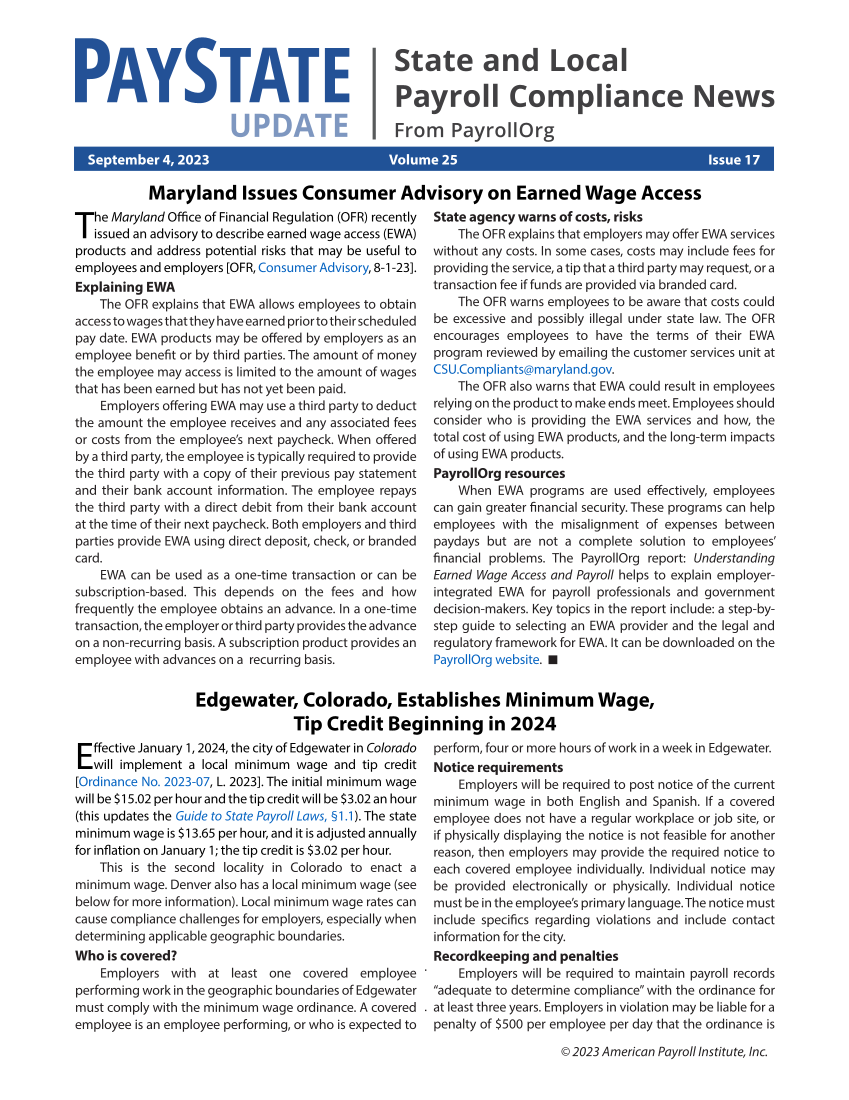© 2023 American Payroll Institute, Inc. Maryland Issues Consumer Advisory on Earned Wage Access The Maryland Office of Financial Regulation (OFR) recently issued an advisory to describe earned wage access (EWA) products and address potential risks that may be useful to employees and employers [OFR, Consumer Advisory, 8-1-23]. Explaining EWA The OFR explains that EWA allows employees to obtain access to wages that they have earned prior to their scheduled pay date. EWA products may be offered by employers as an employee benefit or by third parties. The amount of money the employee may access is limited to the amount of wages that has been earned but has not yet been paid. Employers offering EWA may use a third party to deduct the amount the employee receives and any associated fees or costs from the employee’s next paycheck. When offered by a third party, the employee is typically required to provide the third party with a copy of their previous pay statement and their bank account information. The employee repays the third party with a direct debit from their bank account at the time of their next paycheck. Both employers and third parties provide EWA using direct deposit, check, or branded card. EWA can be used as a one-time transaction or can be subscription-based. This depends on the fees and how frequently the employee obtains an advance. In a one-time transaction, the employer or third party provides the advance on a non-recurring basis. A subscription product provides an employee with advances on a recurring basis. State agency warns of costs, risks The OFR explains that employers may offer EWA services without any costs. In some cases, costs may include fees for providing the service, a tip that a third party may request, or a transaction fee if funds are provided via branded card. The OFR warns employees to be aware that costs could be excessive and possibly illegal under state law. The OFR encourages employees to have the terms of their EWA program reviewed by emailing the customer services unit at CSU.Compliants@maryland.gov. The OFR also warns that EWA could result in employees relying on the product to make ends meet. Employees should consider who is providing the EWA services and how, the total cost of using EWA products, and the long-term impacts of using EWA products. PayrollOrg resources When EWA programs are used effectively, employees can gain greater financial security. These programs can help employees with the misalignment of expenses between paydays but are not a complete solution to employees’ financial problems. The PayrollOrg report: Understanding Earned Wage Access and Payroll helps to explain employer- integrated EWA for payroll professionals and government decision-makers. Key topics in the report include: a step-by- step guide to selecting an EWA provider and the legal and regulatory framework for EWA. It can be downloaded on the PayrollOrg website. Edgewater, Colorado, Establishes Minimum Wage, Tip Credit Beginning in 2024 Effective January 1, 2024, the city of Edgewater in Colorado will implement a local minimum wage and tip credit [Ordinance No. 2023-07, L. 2023]. The initial minimum wage will be $15.02 per hour and the tip credit will be $3.02 an hour (this updates the Guide to State Payroll Laws, §1.1). The state minimum wage is $13.65 per hour, and it is adjusted annually for inflation on January 1 the tip credit is $3.02 per hour. This is the second locality in Colorado to enact a minimum wage. Denver also has a local minimum wage (see below for more information). Local minimum wage rates can cause compliance challenges for employers, especially when determining applicable geographic boundaries. Who is covered? Employers with at least one covered employee performing work in the geographic boundaries of Edgewater must comply with the minimum wage ordinance. A covered employee is an employee performing, or who is expected to perform, four or more hours of work in a week in Edgewater. Notice requirements Employers will be required to post notice of the current minimum wage in both English and Spanish. If a covered employee does not have a regular workplace or job site, or if physically displaying the notice is not feasible for another reason, then employers may provide the required notice to each covered employee individually. Individual notice may be provided electronically or physically. Individual notice must be in the employee’s primary language. The notice must include specifics regarding violations and include contact information for the city. Recordkeeping and penalties Employers will be required to maintain payroll records “adequate to determine compliance” with the ordinance for at least three years. Employers in violation may be liable for a penalty of $500 per employee per day that the ordinance is September 4, 2023 Volume 25 Issue 17
Printed for: PayrollOrg Bookshelf © 2024 American Payroll Institute, Inc. All Rights reserved. From: PayrollOrg Digital Publications (bookshelf.payroll.org)






